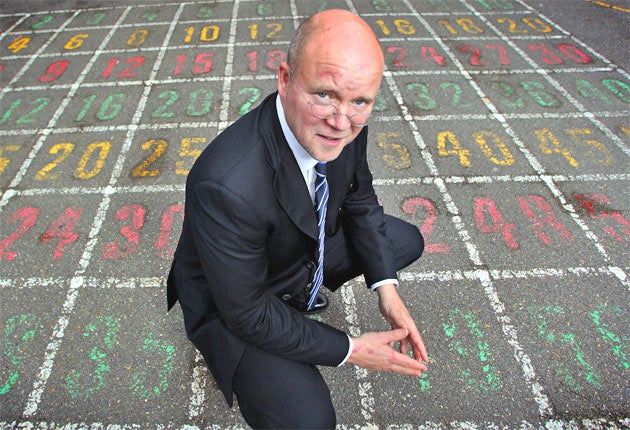Toby Young: 'Free school movement should be all about mavericks like me'
The journalist and author tells Richard Garner why he chose to open a school – and why Michael Gove doesn't want others to follow his lead

Free school pioneer Toby Young today claims the Coalition Government is making it harder for parents to set up and run their own schools as part of its flagship scheme. The journalist and author will see his labours come to fruition this morning as his West London free school opens its doors to pupils for the first time.
However, in an interview with The Independent, he warns that the path to setting up a free school might not be so easy for parents in future. This is because ministers have tightened up the rules – making it almost essential that any potential bidder will need the support of professional educational consultants to plot a way through the bureaucracy,
As a result, parents have turned to academy sponsors such as E-ACT and ARK, the charity set up by hedge fund entrepreneur Arpad Busson, with the result that they end up running the school.
"I think this is a shame," Young said. "I think one of the virtues of the free school policy is that it involves parents in the ongoing life of the school. All the research suggests the more involved they are in their children's education the better the children do.
"ARK, E-ACT and the Harris Foundation are all good at running schools, but at the end of the day the free-school movement should be about mavericks like us setting up an innovative school rather than academy sponsors setting up a chain of 13 schools that are one of a kind."
Young, whose school in Hammersmith, west London, will take 120 first-year secondary school students, said he was not sure whether he would have been successful if he had waited a year to go ahead. "I wanted to be the first to get a funding agreement," he said. "My wife thought it was just down to my competitive instincts but I really thought that – by being first – we would have a better chance."
He said he could see why the new procedures had been brought in.
"The last thing Michael Gove (the Education Secretary) wants is a high- profile free school collapse on his hands," he said. "However, the indirect consequence of the tightening up of the previous process is that it is going to be much easier for the multi-academy sponsors to set up two schools than forgroups like mine."
He revealed that his group had been involved in discussions with groups like CfBT and ARK to see if they could help with the running of the school but – in the end – had decided to go it alone. "We wanted the school to have a particular individual character," he said.
Today's opening marks the culmination of two years of planning. The school will insist its students all study six subjects to GCSE level — English language, English literature, one science, maths, either Latin or a modern foreign language and history. The diet is similar to the new English Baccalaureate promoted by the Government, but will not insist on two sciences.
The school will build to full capacity over five years but has already created great interest from parents, with 500 applying for its 120 places. Under its admissions procedure, half the places are allocated by proximity to the school and the rest by lottery.
Young acknowledges that the school probably has fewer children on free school meals than the average for the neighbourhood but more than the national average. "We want our pupils to be a genuinely diverse group reflecting the social and ethnic mix of the neighbourhood," he said. "We haven't achieved that yet but we hope to achieve it in the next couple of years."
He argues that only if they are truly reflective will they be able to tell whether they have achieved better results through their approach.
The project is probably the one among all the 24 free schools opening this term that has attracted the most controversy – possibly because it has been more in the spotlight through its pioneer's substantial and sometimes abrasive media presence.
However, he says he has established good relations with neighbouring schools and the local authority. The council found him the temporary site the school now occupies (it was formerly a special school) and has arranged for it to move to larger premises in a couple of years. The former head of London Oratory – one of the neighbouring schools, has put his weight behind the project.
"Believe it or not," he says with a slightly quizzically raised eyebrow, "I have been fairly diplomatic in dealing with the local authority and neighbouring schools."
The school acknowledges it will be a long five-year wait until the first students sit their GCSEs to see whether the experiment has succeeded.
Join our commenting forum
Join thought-provoking conversations, follow other Independent readers and see their replies
Comments